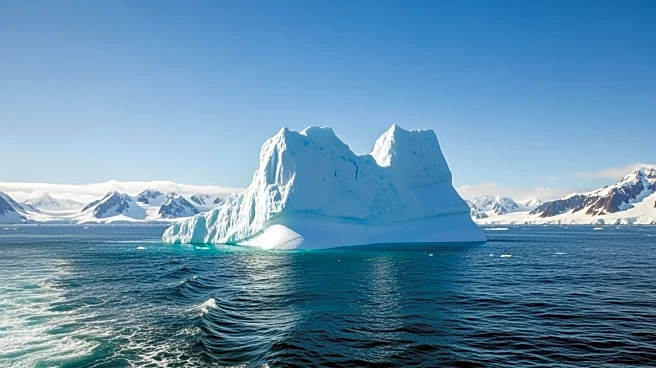What's Happening?
The Hektoria Glacier in Antarctica has retreated by over 8 kilometers in just two months, sparking a scientific debate over the causes of this rapid change. A new study suggests that the glacier's front,
previously grounded on the seabed, rapidly destabilized, leading to an unprecedented retreat. This process, if occurring elsewhere in Antarctica, could significantly accelerate sea-level rise. However, some scientists argue that the glacier was floating, making the changes less unusual. The retreat follows the breakup of sea ice that had previously stabilized the glacier after the collapse of the Larsen B ice shelf in 2002.
Why It's Important?
The rapid retreat of the Hektoria Glacier is a critical indicator of the potential for accelerated sea-level rise due to climate change. If similar processes occur in other parts of Antarctica, it could lead to significant global impacts, particularly for coastal communities. The scientific debate highlights the complexity of glacial dynamics and the need for accurate data to understand these changes. The findings emphasize the urgency of addressing climate change to mitigate its effects on polar regions and global sea levels.
What's Next?
Further research is needed to determine the exact mechanisms behind the Hektoria Glacier's retreat and whether similar conditions exist elsewhere in Antarctica. The scientific community is divided on the grounding line's position, which is crucial for understanding the retreat's significance. Continued satellite monitoring and data collection are essential to resolve these uncertainties and predict future changes in the Antarctic ice sheet. The findings may prompt policymakers to consider more aggressive climate action to mitigate the impacts of sea level rise.
Beyond the Headlines
The retreat of Hektoria Glacier raises ethical and environmental concerns about the impact of human-induced climate change on polar regions. The rapid changes observed in Antarctica challenge previous assumptions about the continent's resilience to warming temperatures. This development highlights the need for international cooperation in addressing climate change and protecting vulnerable ecosystems. The potential for similar retreats in other glaciers could lead to long-term shifts in global sea levels, affecting millions of people living in coastal areas.









